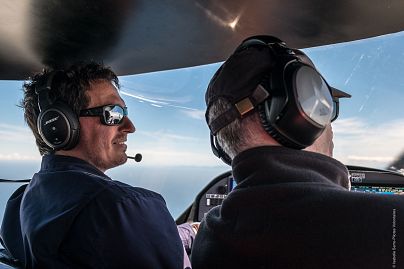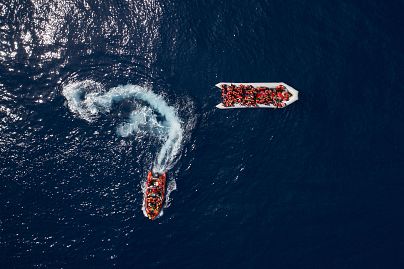More than 600 migrants have died so far this year trying to cross the Mediterranean Sea.
As the sun shone over the Mediterranean Sea, a small plane took off from the island nation of Malta.
On board were two French pilots, José Benavente and Benoit Micolon, who months earlier pooled their life savings to buy the aircraft now carrying them over the ocean separating Europe from North Africa.
Their plan: to save lives by spotting rickety, overcrowded migrant vessels before it's too late.
On this mission — their first, on May 12 — Benavente and Micolon spotted two boats.
The first was empty. It had been marked "SAR 12/05/18," indicating the migrants had been rescued earlier in the day. The other, a Zodiac inflatable boat with over 100 people on board, was in the midst of its own rescue operation.
After six hours and 870 miles in the air, Benavente and Micolon returned to Malta satisfied.
"Today was rich in emotion," they posted on the Facebook page of their aid group, Pilotes Volontaires (Volunteer Pilots). "After three months of preparation, we were finally able to carry out our first surveillance flight."
'Doing what I can'
Benavente, 49, has been involved in humanitarian work for 25 years. He told NBC News he'd been mulling how to put his passion for flying to good use since first hearing of migrants dying at sea some 15 years ago while stationed in Africa for the International Committee of the Red Cross.
The haunting image of Aylan Kurdi, a 3-year-old Syrian boy whose body washed up on a Turkish beach in September 2015, spurred him into action and he began following the work of nonprofit groups in the Mediterranean.
Convinced he could help, Benavente reached out to Micolon, whom he had met in 2006 while training for his pilot's license.
"When Jose described to me the inhuman conditions in which people were leaving Libya, I decided to do something," Micolon said.
Their solution was to launch Pilotes Volontaires in January, spending their combined $150,000 savings to buy a small plane.
"José and I bought the plane with our own personal money because otherwise we would have wasted too much time searching for financing," Micolon explained to NBC News.
The pair haven't given up their day jobs, though — Benavente is a full-time volunteer in the aid sector and Micolon is a commercial pilot.
They named their single-engined MCR 4 plane "Colibri" — "Hummingbird" — after a Native American legend in which a hummingbird tries to stop a forest fire by picking up water and putting it, drop by drop, onto the burning trees. Asked by other animals what it is doing, the little bird replies: "I'm doing what I can."
The friends raced against the clock to get their venture off the ground by May, when favorable weather conditions bring a surge in the number of migrants boats — and with it, the death toll.
Treacherous route
Europe and the Middle East have been grappling with a migrant and refugee crisis since the war in Syria erupted in 2011. The situation was exacerbated by the rise of the Islamic State, which spread its terror through swaths of the Middle East and forced hundreds of thousands to abandon their home countries.
In 2015, more than 1 million people reached Italy and Greece by sea. Since then deals struck by the European Union, Turkey and Libya have seen the numbers drop, but the Mediterranean Sea remains a popular crossing point despite the danger.
According to the International Organization for Migration (IOM), 171,635 migrants and refugees entered Europe by sea last year, while more than 3,000 died making the attempt. So far this year, over 600 people have drowned while 23,715 others have made it.
Aid groups and authorities rely on migrants or traffickers using satellite phones to alert them — or third parties such as nearby merchant ships — with a distress signal. If resources allow, the Maritime Rescue Coordination Center in Rome will send a plane or a helicopter to locate the boat and send the coordinates to rescue vessels.
"It's not easy though, because the [migrant] boats are small and the area is quite large," said Antoine Laurent, maritime manager at SOS Mediterranée, an organization that seeks to save lives in the Mediterranean.
Planes can help cut out the middle man, covering more ground and alerting authorities to migrants at sea before it's too late.
Sea-Watch, a nonprofit group that began operating in 2014 with a ship, invested in a plane last year they named the "Moonbird." Hopes are that Pilotes Volontaires will reinforce the rescue network.
Two planes are better than one
The two organizations have plans to coordinate their efforts.
When two planes are available, Micolon said, the groups divide the search area or split the day to provide aerial cover for more hours in the day.
Tamino Bohm, the head of the "Moonbird" mission at Sea-Watch, told NBC News that he welcomed the arrival of Pilotes Volontaires.
"We have proven that civil aerial reconnaissance is needed, and as the search and rescue area is extremely big, we're really looking forward to cooperating with Pilotes Volontaires in the future," he said. "As we are both based in different locations, different weather might ground one of us on certain days, so then the other aircraft can still go out."
Its aerial-only operations have also allowed Pilotes Volontaires to keep costs down. Sea-Watch, which operates multiple ships and a plane, spent $1.8 million in 2017, according to the OpenMigration project.
Pilotes Volontaires estimates that its annual operation will cost $335,000 because, as Micolon highlighted, "using a plane is expensive: about 150 euros per hour."
Benavente and Micolon have only just spread their wings over the Mediterranean, but they have already received 20 percent of their estimated budget through donations.
They hope public support will help their little hummingbird have a big impact.
"We hope donations will allow us to continue as long as it will be necessary," they said. "In fact, we've been reassured by the public's beautiful response."













